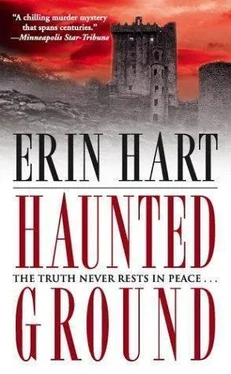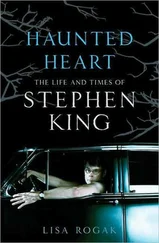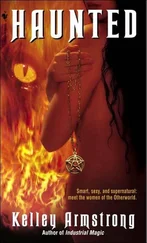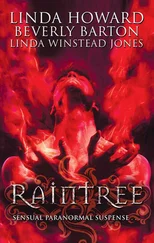“He hasn’t chosen to share any information with me on that subject, Detective, and it’s really none of my business. My son and I are only guests in this house.” She rearranged a rose stem to turn the bloom outward, then reached for a spray of greenery that would serve as the final touch, snipping the long stem into shorter sprigs, adding them to the arrangement, and adjusting the balance here and there with an expert’s quick, decisive motion.
“That reminds me, I’d also like to speak to your son, if he’s here,” Devaney said. Lucy Osborne stiffened, and Devaney at once saw the cause. In her haste, she had pricked her finger on a hidden rose thorn. A droplet of bright red blood fell onto the wooden tabletop.
“Are you all right? Can I help?”
“I’m quite all right, Detective,” she said, pinching her injured finger to stem the bleeding. Devaney noted the large diamond on her left hand while she fished in the drawer of the table for a bandage. Lucy Osborne was evidently prepared for such occurrences, and had the wound bound up in a few seconds.
“You asked about my son. I believe Jeremy is over at the priory today, helping with the excavation. Now, if you would excuse me, Detective, I must get these flowers to the church.”
From where he stood in the sacristy at St. Columba’s, Garrett Devaney could see seven or eight people sitting at some distance from one another in the pews just beside the confessional. Father Kinsella had gone into the central compartment a few minutes earlier, and was just hearing the first confession. The faces in the pews were familiar to Devaney. They were mostly older women. He could see Mrs. Phelan, one of the regulars Kinsella had mentioned, Mary Hickey, and Helen Rourke, all charter members of the Father Kinsella fan club, who might gladly make up sins for the opportunity to confess them to the handsome young cleric.
He thought of Kinsella, sitting there in the darkness of the confessional. It must be strange listening to the petty jealousies, the slights and counter-slights that made up the multitude of sins, dispensing novenas and Hail Marys like a village doctor treating numberless cases of flu. Though he never felt it himself, Devaney imagined that the urge to confess must be strong. When he first joined the Guards, every time there was a particularly horrible crime reported in the papers—the sort of act that made people cringe even as they soaked up every available and repellent detail—a smattering of false confessions would turn up. Most were from people desperate for attention or delusional, who once might have harbored thoughts of committing such a crime, and felt they ought to be punished for even imagining such a thing.
The words from the confessional swam once more to the forefront of Devaney’s consciousness: He knows where they are. What if Kinsella had succumbed to the desires of the flesh? If he and Mina Osborne had so much in common, perhaps he had helped her to disappear. And if indeed he had, that might explain why she hadn’t contacted her mother. But Kinsella hadn’t appeared the least bit ruffled when he discovered the carved letters; on the contrary, he’d seemed intrigued. Still, it was worth looking into.
Mrs. Rourke was just shuffling into the confessional when he noticed another figure in the side chapel, head bent over clasped hands. When the man raised his head, Devaney could see that it was Brendan McGann. Brendan had never been a cheerful-looking man, but he looked particularly troubled at the moment. What was he waiting to confess? The McGanns were Osborne’s nearest neighbors. Devaney vaguely remembered talk of Brendan objecting to the development at Drumcleggan Priory. Squabbles over land, no matter what the cause, had a history of escalating into the bitterest of disputes. He considered McGann’s darkened countenance once more, and decided that this, too, might be worth checking out.
There was no one in the foyer at Bracklyn when Nora and Cormac returned from their outing, and she was still feeling a bit light-headed from what had taken place out on the Tullymore road.
“Hey, don’t you think we’d better take off our shoes, at least?” she asked, as Cormac seemed ready to head straight up the stairs. “I’ve already had a complaint about extra traffic muddying up the floors,” she whispered.
“Oh, right.”
“My bloody laces are too tight now. I can’t get them undone.”
“Here, let me try,” he said. Jeremy came through the door at the top of the kitchen stairs just as Cormac was kneeling to have a look at her muddy shoelaces; her hand rested lightly on his shoulder.
“Hello, Jeremy,” Nora said, then watched as the boy’s expression changed from pleasure at their return, to surprise and bewilderment at their disheveled appearance. “I’m sure looking at the state of us, you’re probably glad you didn’t come along after all.” He didn’t reply.
“Near miss with a sheep,” she continued. “The car went right off the road.” Something in Jeremy’s face made her acutely aware of the mud on her back and elbows, and the dark patches on the knees of Cormac’s trousers, and how they might easily be misconstrued. From the sudden heat in her face, Nora knew that she was blushing deeply, but there was nothing she could do to stop it. Jeremy’s looks, and his silence, only made matters worse. She nattered on about how they were finally rescued by a trio of farmers. “Three brothers by the name of Farrell. Hauled us out of the muck with a chain. Michael was good enough to give me an old potato sack from the back of their car, to keep from getting my upholstery muddy.”
“Too late for your upholstery, I’m afraid, but it did save the car.” Cormac must be completely unaware of what was happening here. Perhaps he hadn’t seen Jeremy’s accusing look as he dealt with the laces. But why did he have to pick this moment to demonstrate his sense of humor? Cormac went on: “We’ll be down for supper as soon as we’ve changed, Jeremy, if you’d like to join us.”
Nora watched the boy’s eyes flicker from her face to Cormac’s, and watched with a sinking heart as the hurt began to harden in them, and his jaw muscles began to tense in the slight concavity of his cheeks. He was just a boy, and everything mattered so much when you were young. Cormac looked evenly at Jeremy. Could he really have missed all this? Retreat seemed like the best strategy at the moment; they could talk later.
“Well, lads, I’d love to stand here chatting, but I’ve got to get rid of this mud,” Nora said. “See you in a bit.” She walked between them, holding her mucky shoes aloft.
“Will you come down and have supper with us?” Cormac asked again. This time the boy offered a barely audible response, which seemed to satisfy, because Cormac began to follow a few steps behind her. As she turned on the landing, Nora could see Jeremy standing in the foyer with his hands in his pockets, following their movement up the stairs with a new coldness in his eyes.
Jeremy did not come down to the kitchen for supper. As she and Cormac lingered over their evening meal, Nora alternately suffered twinges of guilt for perhaps having alienated Jeremy, and small surges of gratitude for time alone with Cormac. He had not even so much as brushed against her while they were preparing the meal, and neither of them had mentioned the momentary madness that overtook them on the road from Tullymore. They both seemed to be engaged in an elaborate game of avoidance, but the question that loomed—at least in her own mind—was not whether such a thing might ever happen again, but when. And yet she wasn’t even quite sure how she felt about it. She wasn’t ready for things to progress any further than they already had. There was so much Cormac didn’t know.
Читать дальше











